|

Bee enjoying "butterfly" milkweed, Asclepias tuberosa.
(*photo
by Sally Ramsdell)
September 1, 2011 Wine-Making
We all like to excel in the art of making something, and we
strive for a variety of reasons: because the product is needed for
living situations; because it is exciting to make; because it binds
people together during the making process; because it is higher
quality and worth our pride; because it expresses ourselves and our
local community; because it can be a subject of wider discussion;
and because it can be used for unique celebrations. Wine-making
fits all of these conditions quite well.well.
Wine was known to the ancients to use for celebration and to
purify drinking water; wine was a needed component in our
ancestor's lives -- for health and safety were at stake. Many of
us forget or never knew the pressure to make beverages that added
sustenance and safety to precarious living in olden times. Wine-
making always involved the entire family in picking grapes, hauling
them to the press, stomping them to a mush, placing extracted juice
in vats, controlling the fermenting process, and bottling the
product. With tender loving care, wine marks the locality where
grown and process with its own characteristics. Thus families and
locality both add to making a unique wine with associated pride in
flavor and quality.
This year, I have grown a respectable harvest of grapes from
a series of slips after several years of fertilizing with aged
horse manure. The clusters were heavy but certainly not sufficient
for a batch of wine that I had tried on previous occasions --
perhaps winemaking is in my genes. My grandparents came to America
in the 1870s, and my grandfather, a veteran of the Franco-Prussian
War, had ambitions to become an American wine-maker. He came to a
region inhabited by fellow Alsatians and settled near Augusta,
Kentucky, the center of America's fledgling wine industry at that
time. Soon after his arrival, a massive blight wiped out all the
grape vines east of the Rockies, and thereupon California became
the wine center of America -- and Grandfather Peter had to resort
to mixed farming in the Ohio Valley. However, 130 years later,
this valley is developing a wine-making resurgence.
What is the relationship between wine-making and Earthhealing?
Wine is grown locally and yet has soothing and healing effects on
a wider level; it requires local effort with a broader view in mind
as part of a global wine-loving community. Wine is healing; Earth
is healed at the local level first and yet the product has global
ramifications as though a ripple effect; we think globally and act
locally as fellow French-American Rene Dubos coined -- with a
postscript that you may want to read about tomorrow.
Prayer: Lord, you give to us the power to transform wine into
the Blood of Christ so that we enter into the collective healing of
our planet and its people. Help us to see that this transformative
power in lowly wine can go out to all the world in many ways.

Enjoy a lovely spray of snowball bush flowers.
(*photo
by Sally Ramsdell)
September 2, 2011
Think Globally, Act Locally, But All Act As One
It is important that we act and so the great early
environmentalist, Rene Dubos, publicized the adage to "Think
Globally, Act Locally." My love for the expression in early
environmental work gave way over time to more wordy appended
expressions that lacked being "catchy." However, an expanding
knowledge of environmental issues meant one could not be satisfied
at working just at the local level. In fact, more disquieting than
for those who act locally and never think globally are those who
think about global matters but never act in a domestic green
fashion. The global traveler who never plants a garden, recycles
waste materials, or drives an energy efficient vehicle is no better
than the homesteader who never thinks about climate-change effects.
Our locality gives grounding to our work. If we do not grow
our own food at least in part, and if we are not watchful on what
we eat, how we drive, how we heat our homes, or what we recycle, we
become somewhat hollow-sounding -- and others detect it. The
grounding allows us to experience the gray areas of environmental
work, the failures due to weather disasters, the damage from hungry
but overpopulating deer, early frosts and seed that does not
germinate, and wishful dreams laid bare by lack of funds. Local
reality makes us aware of the difficult global struggles ahead.
Global views energize our actions. We discover that
environmental issues such as climate change, polar energy
extraction safeguards, acid rain precipitation, or dying coral
reefs cannot be solved at the local level. A global view allows us
to balance needs on various levels of governance and invites us to
participate in global campaigns to save our wounded planet. By use
of the Internet even those of us with quite limited means can still
effect global change -- through cooperation with others.
"Everything is connected to everything else." Thinking globally
accepts the global nature of our actions and allows us to see the
necessity of connections with people in other localities.
My reason for suggesting this addition of all acting as one is
for the sake of ecological balance; we must see the need to focus
HERE in our locality and yet act NOW in our world, and act together
as one people, a WE. The HERE gives us the basic creation that we
must touch and feel and fashion in our backyard; the NOW gives us
the urgency to think beyond ourselves, to hear of the needs of
people in various lands and to see that joint action is needed;
the WE are the ones who must act in solidarity so that we can have
success that is grander than what individuals can do. The WE must
emerge from the ranks, the facilitators who see the need for
interactivity and are ready to promote it. A global network is
thus a grand creation of all working together for goals of a
healthy Earth.
Prayer: Lord, give us the energy to work at the local scene,
the foresight to see what must be done now, and the faith it takes
to see that a future can come through cooperative efforts.

Can you spot all the insects on this daylily flower?
(*photo
by Sally Ramsdell)
September 3, 2011 Justification of Pastoral Work
The more you sow, the more you reap. (2 Cor.
9:6)
Some environmentalists ask me why am I spending time
in pastoral work (pastor of one church and parish priest at another) with so
many environmental issues at stake. True, as agreed in2004, I spend my 25 hours
per week collectively in my two parishes. But I also spend 25 hours per week in
environmental work (this website) along with more hours per week in additional
pursuits including writing, gardening, and solving real puzzles (my hobby).
Parish service is very special. This work helps improve my interior ecology and
locates me in a local community and beyond. The rationale may be solid but what
about for a person nearly 78?
My work is enjoyable. Is this so bad when
coming from a family of workers? Some call this workaholism, a pejorative term
when referring to people addicted to work and generally under stressful
conditions either self-imposed or through conditions of employment. For me, rest
is certainly necessary and is the interlude that enhances hard work and makes it
meaningful.
My work is a privilege. For me, work started
at age six and was regarded as something to contribute to a family unit. Work
was a privilege that will last as long as our health -- and God has blessed me
with good health all these years. Work fulfills our livelihood and gives
meaning to our lives. To those who say it is "being," not "doing," that is
important, one response is that we become or enter our being fully through
doing.
My work is needed. Though I am one of the
oldest pastors in Kentucky and the oldest in our Jesuit Province, I realize that
substitutes who could give quality service are not currently available. I
turned my prison work (one hundred miles away) over to the local pastor near the
two federal Manchester prisons -- and he has confidence in his ministry and uses
his acquired Spanish.
My work allows me to experience being poor, a
necessity for any radical environmentalist. Part of that experience is
realizing that no matter how much we try we are not perfect and depend on the
power of God working through us.
My work grounds me with poor Earth/poor people.
Those in environmental work would say that threatened and endangered flora and
fauna are impoverished and rightly so. But human poor folks are part of this
current condition, and we must solve the environmental issues in the light of
human social needs. Furthermore, changes required to save our Earth are to be
undertaken in a meaningful way by the poor.
Prayer: Lord, I know you love a cheerful
giver. Help me make my work cheerfully and gratefully given for your glory
through the inspiration and comfort of the Spirit. Allow this always to be done
in profound gratitude for the opportunity to work.

Bee on wild rose.
(*photo
by Sally Ramsdell)
September 4, 2011 Fraternal Correction and
Work
If today you hear his voice, harden not your
hearts. (Psalm95)
Correction is always part of the journey of faith
because we can easily deviate from the true path and hardly notice it. We need
others to be companions on our road, so that wrong turns are pointed out, and we
can keep on the right course. A caring correcting person has to do so out of
love, and is interested in everyone's personal salvation as in his or her own.
Mercy is extended in a godly manner. In the gospel (Matthew 18: 15-20)Jesus
teaches us the way to correction that is filled with concern for the wayward
person. We cannot ignore waywardness, for something must be done. Our first
response is to go and point out the wrongful practice, but to keep it between
the two of us. In this way corrective measures can occur with the least
embarrass mentor social disruption.
But the one-on-one situation does not always work
and often the wayward practice continues. Then it is necessary for me to take
it a step further, and I must go to others who can help when I am unable.
Usually a person has heard from me on other issues and so takes this one lightly
or "with a grain of salt." The bringing of others who agree with me to the
scene has a dramatic effect, for it says the case is known to others and they
are intent on collective correction, an "intervention" of sorts. This second
level will quite often have an effect on the culprit.
When the first two levels are exhausted, correction
is extended to the "church," which here means the entire believing community.
In this context the wrongful practice is made even more public, since the entire
community is being affected by the wrongful action. Again Jesus speaks that
what we bind on Earth is bound in heaven, as mentioned here two weeks ago in
Matthew, Chapter 16. This repeating of words shows the importance of the
function of corrective action within a faith community. We cannot be silent; we
must speak when wrongdoing occurs and bears corrective costs.
Life on our planet is threatened, and thus we must
respond in some manner. Precious life is threatened by those who do wrongful
acts, waste resources meant for the destitute and the future generations, and
extend a sense of recklessness to others. We try correction at the individual
or small group level but, if and when these correctives are not effective, we do
not hesitate to take the matters to a political enforcement agency. Our efforts
must include ensuring that the agency does its duty and that our elected
representatives are aware when enforcement is lax. Fraternal correction is a
major ingredient of our earthhealing ministry, and our reluctant silence becomes
part of the problem. Saving our wounded planet involves difficult fraternal
correction.
Prayer: Lord, show us when to enter the fray
and help address corrective measures that must be undertaken here and now.

Red cabbage, nature's work of art
(* photo by Sally Ramsdell)
September 5, 2011 Work as Labor for
Some, as Dream for Others
On this Labor Day we ought to
reflect that one-tenth of Americans of working age are unable to find meaningful
work. Likewise, at the same time an increasing number of people have found their
jobs taken over by machines, by other laborers in distant lands, or combined and
forced on fellow workers. The perceptive who see this movement of job
elimination are met by dismissal slips, and they are replaced by others eager to
work for less and under harsher conditions. Many workers spend long hours at
jobs and feel their work contributes to the social order and human wellbeing.
Unfortunately, others do not have this experience. They see themselves as part
of a dysfunctional economic system that allows bosses and investors to make
massive untaxed profits, and others who work hard to barely make a living. Their
hope is that their elected representatives will take notice and help bring about
needed legislative change.
For laborers, regard work as
a privilege to earn your livelihood. However, many of you are forced to take
excessive tasks because by cutting out other laborers, the captains of the job
world can expand profits. Labor is a form of service for others and, when not
too onerous, it can be a point of pride that one is able to bring home enough to
support a family. Service can become the expression of who we are, for as
Christ came to serve, each worker can feel a deep sense of worth in serving
others through doing a respectable job well. Thus the privilege of making a
living brings dignity to those who labor.
For the unemployed, patience
is not enough. The anger may be righteous, for a nation that requires civic
duties such as voting and jury duty, must also accept a collective
responsibility to give employment to all so the promise of life, liberty, and
the pursuit of happiness can be rightfully fulfilled by every citizen. With an
occupation one obtains resources needed for essentials of life. The dignity and
privilege of labor comes when one can earn his or her keep, can direct the
conditions of life, and can pursue happiness that includes a moderate quality of
life for oneself and those dependent on him or her for support.
Meaningful work within certain
limits of social justice along with an opportunity to work are two parts of
Labor Day's overview. It is not enough that some should work and some look for
work; we are to help create the job opportunities; there is plenty of work
needed to rebuild a national and global infrastructure; there are plenty of
potential laborers; there are plenty of financial resources locked away in
global tax havens. The factors must be brought together through governmental
agencies: work opportunities, laborers willing to work, and resources taxed for
use as wages.
Prayer: Help us, Lord, to
see the privilege that comes with meaningful work opportunities, and give us
energy to change an unjust system so that all who are willing have the privilege
to serve others by contributing to what needs to be done.

Eastern Towhee, Pipilo erythrophthalmus,
Estill Co., KY
(Photo by Sally Ramsdell)
September 6, 2011 Dilemma
for Pro-Life Environmentalists
The 2012 presidential election
season is just around the corner, and national and state candidates are vying
for support. In horror, we pro-lifers see our issues becoming partisan in ways
never before observed. Some deny scientific evidence as to human causation of
climate change; others regard this denial as reckless and not pro-life in the
fuller definition. The vitality of our fragile planet hangs in the balance.
After the 2010 election, the Catholic News Service reported that this was the
most "pro-life congress" in recent decades. While many of the newly elected
affirmed pro-life stances, they also denied human involvement in climate change
-- a denial similar to those advocated by groups that prolonged health decisions
about tobacco as a cause for lung cancer; in the ensuing three decades tobacco
companies reaped billions of dollars in profits. Through spite, some partisans
want to gut the U.S. Environmental Protection Agency's enforcement powers over
CO2 emissions and climate change curtailment.
Forgetting the entire web of life,
these congress members deny human-causation of climate change emissions
and thus may become the LEAST pro-life Congress. To reduce or eliminate funding
under the excuse of being fiscally responsible is disingenuous. To
escape to other issues regarded as equally pressing, when Earth herself is
under threat, is reprehensible. Pro-life advocates who champion the cause of
the fetus, senior citizen, hospice patient, and death-row inmate cannot remain
silent. Mindful of the entire web of life makes us aware that current air
pollution threatens to increase overall global temperatures, acidify oceans,
disrupt coral reefs, melt glaciers and permafrost, and precipitate floods and
droughts of monumental proportions. Can we afford to allow the same
profit-oriented propaganda mills, which denied tobacco-smoking dangers for
several decades in the last century to capture this issue -- only with different
money sources? Will moral leaders remain silent and thus inadvertently become
partisan?
The dilemma involves support for
some reckless candidates in the 2012 election. No one is perfect; no one knows
all issues; but we have to choose among pro-lifers of various degrees. We have
to judge honesty, integrity, openness on major issues, and foresightedness in
matters that voters do not find economic or pressing at this moment. Candidates
ought not be reckless and lack prudence; they must face hard issues. Moral
leaders must point out that the condition of our planet is one such issue.
Unless we take measures to cut greenhouse gas emissions quickly, (these gases
continued to rise in 2011), halting predicted disasters will be unsuccessful. A
so-called pro-life candidate who is anti-environmental is unworthy of our vote.
Moral leaders must speak, for voters face a terrible dilemma: which partial
pro-lifers should we support? The citizen must decide and it is not easy.
Prayer: Lord, give us the
courage to face issues head on in advance of times when we are to act.

Dragonfly pauses on tall grass.
(Photo by Sally Ramsdell)
September 7, 2011
Attention to all "Stacationers"
Okay, it looks like no
entire week off this year for travel to some distant place -- if that is what
defines "vacation." However, need this be a source of guilt? For centuries,
journeys were not regarded as being fun, but necessities in order to visit
another person or take care of important business. Today, high fuel prices,
combined with hot weather and congestion on the road makes a possibility of
partial or total "stacation" seem more a propos for 2011, even if motel
owners and distant tourist attractions say otherwise. Here are points for a
stacation:
* Do different things.
Don't do any of the ordinary things for an entire week. Let it be as though you
are in outer space for this period. Prayers, yes; other activities, no.
* If restless, plan to see
local sites this week. Most of us have never really seen the attractions within
an hour or so drive, and these could be worth the time and effort.
*
Invite in non-demanding relatives and friends who don't get away too often. In
fact, this makes a vacation for them and a social event for the guest as well.
* Take a special hike
starting in the cool of the September day and planning well to carry all needed
ingredients (water, sun block, snacks, hiking stick, extra clothes).
*
Eat different foods and try a new menu. The neighborhood may not have a good
selection of ethnic restaurants but a closer look may discover a mom-and-pop's
place that is ethnically local.
*
Get a book or DVD related to the area you would have visited had you decided to
take the long costly trip to such places. In the end you will know about as
much and at far less travel bother.
*
Sit outside one hour a day. It sounds strange for people with large porches,
but that is something that is a lost tradition now that folks have "air" or air
conditioning and hibernate indoors in hot weather. This is the last part of
summer and we need to reflect on where we have come this season.
*
Read something new or listen to an audiobook. We all have our routines but this
is the perfect week to break them with another kind of book or periodical.
*
At least entertain the possibility to attend a different event this week and
thus have something to look forward to.
*
Do nothing, plan nothing, keep a span of life unplanned, and regard this as
profoundly restful.
Prayer:
Lord, help us be aware of our need for rest, but that this does not necessarily
mean taking distant trips.

Daffodil garden in Kentucky.
(Photo by Sally Ramsdell)
September 8, 2011
Efficiency + Renewables = Economic & National Security
The
title of this Daily Reflection is the theme of the 14th Annual
Congressional Renewable Energy and Energy Efficiency EXPO in mid June in
Washington, DC. The gathering is really a teach-in for members of Congress and
their staffs. Today being International Literacy Day is perfect to
consider energy literacy as needed by our elected representatives and all of
us. In preparation for the EXPO, the Sustainable Energy Coalition listed some
cogent facts:
* America's economy has
tripled in size since 1970, and three-fourths of the energy needed to fuel that
growth came from energy efficiency advances;
*
By applying "best practice" efficiency changes to buildings, vehicles, and
industry, 75% of global energy use could be saved. In the U.S., a $476 billion
investment in just smart grid technologies could yield up to $2 trillion in
benefits;
*
The U.S. energy efficient residential heating, ventilation and air conditioning
market is growing at a compound annual growth rate of 8.6%;
*
According to the Energy Information Administration, in 2011 renewable energy
sources are now providing nearly 12% of domestic energy production and 13% of
net electricity generation;
*
New global investment in clean energy reached $243 billion in 2010, up from
$186.5 billion in 2009. Last year's investment figures double those of 2006;
*
Renewable energy industries employ 850,000-950,000 Americans through a
combination of direct, indirect, and induced jobs;
*
America's wind power industry grew by 15% in 2010 to over 40,000 MW, and this
growth provided 26% of all new electric generating capacity in the country --
second only to natural gas. Costs for wind-generating electricity are now on
par with coal-generated power with wind farms cost-competitive with natural gas;
*
U.S. solar energy industry's total market value grew 67% from $3.6 billion in
2009 to $6.0 billion in 2010 (878 MW in photovoltaic capacity and 78 MW of
concentrating solar power; and
*
Global geothermal power could increase 134% by 2020.
These
and other significant facts are supplied by the Sustainable Energy Coalition,
6930 Carroll Ave, #340, Tacoma Park, MD 20912. If you wish to become a
subscriber contact <kbossong614@yahoo.com>.
Prayer:
Lord, help us to use current information to soften change to energy-saving
techniques and to renewable energy sources.
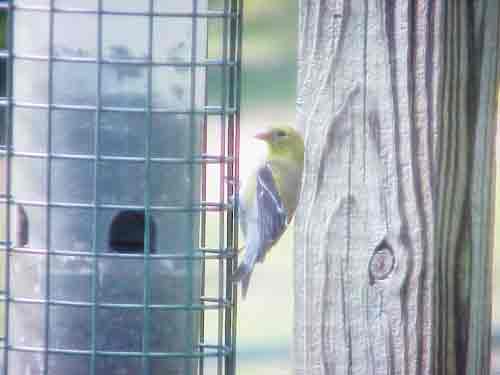
Blue-winged Warbler, Vermivora pinus.
(Photo by Sally Ramsdell)
September 9, 2011
Defending Public Lands
Public
Lands Day comes with a yawn to some, for to them there is no need of
defense, since public land is capable of self-defense. Yes, our country has
one-quarter of its land as "public" or a commons for all to use, but private and
powerful interests are constantly looking at public resources as a gift worth
taking for their own profit: forests, parks, fragile wilderness areas, public
thoroughfares, airwaves, outer space. Their propaganda line is that "private"
corporate controls work best. Such reasoning is quite threatening to the
commons.
Public
lands include national, state, county and city parks plus wilderness areas,
forest lands, military bases, airfields, prisons, highways, cemeteries, historic
monuments, public educational and technical institutions, courthouses, and other
public buildings and land. An alert citizenry realizes that these are commons
worth preserving for the use of all; such citizens are the best guarantor of
public lands. In fact, private lands ought to be put in the public domain for
better treatment. It would be better to extend the domain of public land since
some forests, pasturelands, and wetlands have been over-harvested, over- grazed,
and drained for various so-called development projects. Rangelands ought to be
made public so that the bison will return to areas on which to roam freely. An
informed and watchful citizenry is always better than enlightened individuals
with large landholdings that they mistakenly think they have absolute rights
over.
A
public defense of land involves: preserving existing public lands from
infringements on the commons (resource exploiters, developers, and those using
damaging recreational vehicles); acquiring private lands that have been or could
be damaged by misuse (especially fragile lands and wilderness areas); and
keeping land from the forces of privatization ranging from toll roads and
prisons to waterworks and parks. This is to counter propaganda that
deliberately denigrates public service and management, with little mention of
the motivation of greed, control, and material profit that drives privatization
projects. Defense of public lands should always be non-partisan when it comes
to land use and preservation for future generations.
Public
lands are an investment for both present and future generations. In times of
belt-tightening such as these, public land defense includes volunteer cleanup
parties, policing and enforcement of regulations on preserving public lands,
accepting registration and user fees to keep public lands in sufficient
resources for proper maintenance, and lobbying in defense of public land
improvement and removal of invasive species. Finally, we ought to promote the
benefits of public lands and how much they mean to us as a people with a common
heritage.
Prayer:
Lord, inspire us to defend our land commons, your great creation of which we are
called to be collective stewards.

White spike flower with box elder beetle.
(Photo by Sally Ramsdell)
September 10, 2011 Swap
Ideas Day: Types of Special Alerts
An
old Jesuit friend was passing through from Rome and was to have a meal with our
Lexington Jesuit community. I was alerted by phone a short time before his
arrival, and made a mental note of the day hoping to go after church services.
The driving would be in daylight at this time of year. However, a few days
after the event was to occur, I looked around for a note and found it was the
previous, not the upcoming Friday. Notes are simply too hard to find or to
place where reminding is possible at my age. Here are some ideas I have drawn
up since I an growing in forgetfulness.
Written
notes: A good idea for alerts provided one has a note pad and pen handy at
the moment of the alert. I have them at phones and nightstands, auto dashboards,
and pockets -- when I remember. The resolution is to make the urgent notes
immediately; the problem now is to place it in a place to recall when needed.
Desk
alerts: One of the best things is to paste the alert on one of your
computers (we have two of many things -- two eyes, lungs, kidneys and jewels).
My trouble here is that computer margins are covered with addresses, quotes, and
needed facts.
Computer alerts:
Excellent if a space is given to receive these alerts and we have a habit of
going to it with regularity.
Sound alerts: They
help when the radio is on or we know the outside sirens are not being routinely
tested each Wednesday at 1:00 p.m., but we can easily skip notice of an
approaching storm. Yes, clock alarms are good reminders for those
sleeping, provided we remember to set alarms.
Personal
reminders: Most people are younger and some are more mentally agile, and
thus we entrust them to remind us again as the alert is upon us -- and for the
greater part this works well.
Notes
at door/toilet seat: The places we are sure to use in coming and going can
be excellent when an alert is found there, provided the door's opening and
closing does not loosen the note.
Planner/calendar
alerts: Excellent suggestion! For those of us who are compulsive planners,
this makes full sense. However, there is a hitch. On some occasions I cannot
make out my unintelligible note though it does alert me to some special event.
Refrigerator
notes: This alert has to do with foods to buy or prepare. The alert place
is certainly handy, but generally limited to foods and drinks.
Prayerful
reminders: Some ask the Lord to get an angel to remind them that a special
event is to occur.
Prayer:
Lord, help us to become good at remembering things, and give us special
reminders. You never fail me.

Daylily in vivid colors.
(Photo by Sally Ramsdell)
September 11, 2011
Forgiveness Again and Again
Lord, when my brother
wrongs me how often must I forgive him?
(Matthew 18:21)
Forgiveness is an almost
inexhaustible topic of reflection, and that is because it is difficult to
execute fully for many of us. Forgiveness includes the peace of Christmas, the
mercy of the sufferings on the Cross, and the joy of Easter's resurrection all
wrapped into one. Being willing to forgive is at the heart of the Lord's
Prayer and must be fortified at all ages and seasons.
Our
profession of the resurrection to new life is done in the deed of forgiving, for
we bring back life -- the life of the person forgiving, the relationship of that
person to a forgiving God, and the establishing of a relationship between the
forgiving person to the one forgiven. Nurturing these bonds or relationships is
the most creative thing we can do, and that is why they must be done over and
over, not just once, as Jesus reminds us. We become godly when we are always
prepared to forgive from our hearts.
Forgiving must go beyond
mere words or acceptance of another who wrongs us. An added need emerges. We
discover our own insensitivity that sometimes -- but not always -- makes us part
of the cause of strained conditions in our wronged world. Restoring
relationships must be accompanied by our seeking forgiveness from God for our
part in damaged relationships. We are able to become compassionate toward
others, even aggressors, and not just to limit ourselves to saying that we
forgive them. We see them in themselves, and find there a sense of their human
condition, which needs healing as much as our own broken relationships with God
and our world that we have damaged through misdeeds.
As part of forgiveness, we
extend God's love through our willingness to give blessings. We wish the
forgiven well and do so in all sincerity. We don't want them to continue
immoral or hateful acts that may strain relationships, but we wish them the best
that they can become. Our blessing helps bring this about -- for any blessing
that leaves us, and is not formally rejected, will be beneficial both to the one
giving and to the one receiving the blessing. A blessing is the spiritual
fertilizer that allows the community to grow. It is so much a part of the Good
News.
Some suffer hard times with
people they really love, whether that be a husband or wife, a child or parent, a
friend or co-worker. These can become the saints of this world who are willing
to forgive when others would counsel leaving, forgetting and never looking
back. Jesus tells us to forgive, not seven times, but seventy times seven
(Matthew 18: 21-35). We are to be responsive by continually forgiving, for God
extends infinite mercy and forgiveness to us many times over.
Prayer:
Lord, help us to extend your merciful love to others who have stepped on our
feet in many ways and many times.

Butterfly in pale shafts of light.
(Photo by Sally Ramsdell)
September 12, 2011
Earthhealing and the Laws of Ecology
It
is wise to discover how our earthhealing process must always be ecological. A
wounded Earth is a new experience, and so we are in the process of learning
together that our planet is out of balance. In the book "Earthhealing: A
Resurrection-Centered Approach" (1993 version is on this website) we developed
three ecological principles:
1. All earthly creatures
are interdependent;
2. Natural processes obey
the Law of Conservation of Resources; and
3. Variation and richness
of diversity add to the health and harmony of the total eco-system.
These are discussed within
that book, a new edition of which will appear on this website before the end of
2011. However, there is resemblance of the first two principles to Barry
Commoner's Four Laws of Ecology that will be treated over the next four days.
The third principle is discussed in our book and often within these "Daily
Reflections." In preparation for the following reflections on September 13-16,
let us consider steps that are required for a successful Earthhealing process:
Interdependence -- We
must see the connections between different parts of the system and how working
together is required, because we need to be constantly alert to where one part
that is out of phase affects another part as well. This step involves
understanding that the work must be done, that we cannot do it all ourselves,
and that we must connect with others of good will who have a sense of faith in
the future.
Conservation of
resources -- All instruments and materials must be well placed for immediate
retrieval. An operation does not consist of tossing the tools about to where it
takes time and effort to retrieve them. Earthhealing involves choice of tools
and proper materials; we will not use bulldozers to till garden plots.
--
The natural process of healing is the best one; this must be honored and
respected and allowed to function to the best degree possible. We may be able
to accelerate the healing process but only within the parameters of what can be
done according to the rhythms of nature.
--
Earthhealing takes concerted effort. It always takes more effort to repair
damage than to prevent the damage from occurring in the first place -- that
"ounce of prevention." Once we are aware of the damage, we must resolve to roll
up our sleeves and get to work, for the really difficult tasks are still ahead.
Prayer:
Lord, teach us to be healers and to do so in a systematic manner, for the tasks
ahead require cooperation, concern, attentiveness, and effort on the part of
all. Make us humble workers in the Earthhealing process.
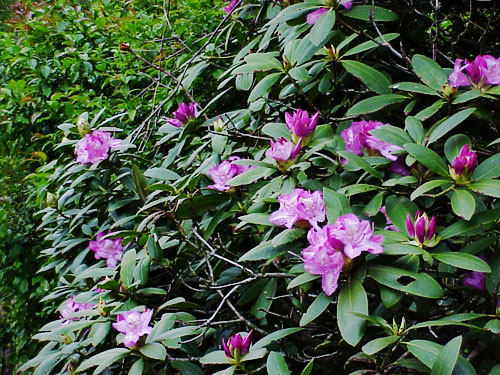
Rhododendron, thriving in acid soil of the Appalachian Region
of Kentucky.
(Photo by Sally Ramsdell)
September 13, 2011
Everything Is Connected to Everything Else
--
First Law of Ecology --
We thank Barry Commoner for describing this first law of ecology, for we often
say that connectedness among all creatures is at the heart of ecological
balance. The health of the planet is connected to the balance that is found in
all aspects of the environment: the interactivity of flora, fauna, climate, and
soils. Damage to one part hurts the rest.
Incidentally,
I got into an inadvertent debate with Barry Commoner around 1980 in a television
show in northeastern Ohio. We were to be and were kindred spirits on general
environmental questions. However, Barry focused blame on internal polluting
culprits; I interjected that individual citizens are also to blame, if for no
more than allowing other culprits to get away with their actions. Personal
responsibility must always be coupled with social repair for we can become the
repairers through personal action -- and the human and non-human communities are
connected.
Historical
connections. This ecological principle had further ramifications that were
and are still theological in implication. When you or I hurt the environment or
human lives of our neighbor, we have to say we are sorry and ask forgiveness.
But the wrong we do has affected the social fabric of the world in some fashion
-- and thus the age-old understanding of temporal effects of sin that must be
repaired (the indulgence controversies of reformation times). Carbon trading
is an inherently weak currently proposed practice for it allows continuation of
malpractice at the expense of others. This is a misunderstanding of a so-called
"indulgence" to continue sinning; its fallacy rests in misunderstanding the
need to repair a damaged structure after malpractice occurs -- and ceases.
Earth needs repair through accountability by someone, not by shifting
responsibility for continued misdeeds to others.
Ecologically,
we can affirm the need for ecological and social repair, and that this
reclamation is necessary to balance an ecological system that has been distorted
in some fashion. When the fragile mantle of our vegetation has been stripped
from land, some form of revegetation or repair must be done to approximate as
near as possible the original vegetative cover. However, with care the repairs
can be satisfying and in the process of repairing we become better people, the
notion of repairing social structures.
Spiritually,
since everything is connected, all of us can contribute to repairing damage done
to our world order. We need to make restitution in some fashion such as good
deeds or prayers and penances. This can be done in union with the suffering,
death and resurrection of Jesus. Our ecological repair becomes an integral part
of social justice.
Prayer:
Lord, teach us to see the connections of all things and that our journey of
faith has an Earthhealing component.

Damselfly in dense foliage.
(Photo by Sally Ramsdell)
September 14, 2011
Everything Must Go Somewhere
--
Second Law of Ecology --
Did
you ever observe someone throw down his coat and cap, and it became obvious that
someone else was forced to pick them up. If we drop something in the trash are
we not doing the same? The discarded item must go somewhere, and most likely it
is to a landfill a few miles away where the trash is buried under some fill dirt
and allowed to decompose. Since the mixed materials include some organic
matter, this landfill emits methane, a decomposition product over twenty times
more powerful than a comparable amount of carbon dioxide (produced when waste
materials are burned).
Tidy
farming people and homesteaders develop techniques to waste less, feed some food
wastes to animals, compost organic materials, and recycle metals, paper and
plastic. On the other hand, an affluent culture thinks that the garbage
disappears -- and the affluent do not have the messy work of disposing of their
garbage. "Going somewhere" means to less economically desirable places at a
distance to where the waste is out of sight.
Nature recycles its
wastes: foliage and plant parts decompose into the soil; the dead animal or
plant is food for the vulture and earthworms; water evaporates, rains down,
flows and is cleansed in wetlands, returns to the oceans and reservoirs, and the
natural cycle continues. We learn from nature, though it requires effort, to
take from the commons and return to it after proper recycling (which often takes
further resources). That is all the more reason that we allow things
(buildings, vehicles, furnishings, etc.) to remain longer than a normal
lifetime, because of the effort it takes to dispose and reuse properly.
Waste
materials are problems. Some chemicals can be decontaminated by reacting them
to produce less toxic products; nuclear contamination cannot be thus
decontaminated as though by magic; the radioactive materials must be collected
and taken to a safer place for storage until nature's work is done, often over
long periods of time. The issue with radioactive materials from nuclear power
plants is that problems remain for extraordinary amounts of time while natural
decay takes effect. Thus we learn that all waste goes somewhere.
Healing
our Earth includes proper placement of all materials. Messiness and
irresponsibility leads to an unhealthy environment. Recycling and proper
disposal are thus medicines needed for this fragile Earth to readjust to the
massive resource use that occurs through ordinary modern living. Earthhealing
takes effort, and so the proper disposal and reuse of materials is part of a
healthy healing process. If we do not like the task of disposing of things,
then don't obtain or use them in the first place.
Prayer:
Lord, teach us the proper destinations of the things we have and the efforts we
undertake. If heaven is our goal, help us plan properly on how to direct our
actions.

Ruby-throated hummingbird, Archilochus colubris.
(Photo by Sally Ramsdell)
September 15, 2011
Third Law: Nature Knows Best
Those
who are affluent can become arrogant and forget how to cooperate in the natural
processes; in fact, such people often look down upon the primitive nature of
natural processes. Respecting nature involves working within natural processes
to the degree that we are able. Use of natural decomposition and wetland
purification are far superior to artificial means that are often introduced.
Exotic
flora. The introduction of kudzu and other species and allowing these to
proliferate to a point they become menaces is well known. Allowing native
species to flourish where and when possible is a good ecological or green
practice. Prefer gardening with native species (mint, poke, etc.). Consider
wildscape and edible landscaping in place of artificial lawns. Introduce a
multitude of native plants and tree varieties that resist drought.
Exotic fauna. When
Europeans came to New England they introduced cattle and sheep; this led to
destruction of Native American limited cultivation and use of forested areas for
wildlife reserves to supplement food supplies -- thus proving destructive to
wilderness areas teeming with game. The story of destruction of Australian
vegetation through introducing rabbits is well known.
Climate
change. We all realize that excessive carbon dioxide and other emissions
can disturb the delicate balance of nature to such a degree that glaciers melt
and oceans rise, along with more frequent severe weather-related storms and
precipitation patterns.
Species
depletion. The removal of native predators such as wolves and foxes that
help hold animal populations in check has been highly disturbing to wildlife
balances; such conditions result in overpopulation of rabbits, deer, geese, and
turkeys.
Obstructions.
Dammed rivers are another area of great ecological disturbance for the natural
rhythm of fish spawning; fish migration is often disrupted by such barriers to
free water flow. Large dams have even greater effect such as the halting of
natural siltation processes and the failure to feed proper nutrients for marine
life further downstream. Large dams and their lakes can destabilize geological
formations and cause earthquakes.
Over-harvesting.
Excessive withdrawal of resources can also trigger threats to native fish
populations (half of the world's supplies are in some degree of endangerment).
The same applies to other fauna and to flora species such as prized timber;
removal of these trees can endanger habitats of songbirds and other wildlife.
Appreciating
natural cycles is needed, especially when human practices involve resource use
or deliberate introduction, removal, or replacement by non-native substitutes.
Prayers:
Help us, Lord, to establish good environmental practice so that the balances of
nature will continue.

Adult male woodpecker feeding immature offspring.
(Photo by Sally Ramsdell)
September 16, 2011 Fourth
Law: No Such Thing as a Free Lunch
The
privileged of this Earth have come to think that if they extract gold or
overfish the oceans they can reap profits with no need for reclamation or
restitution. Their privileges seem to allow them to expect a free lunch.
However, such a philosophy on life underlies the history of exploitation and
damage to primitive cultures, and ultimate destruction of cultural treasures
throughout the world. Each time a species of flora or fauna or a language dies,
the world is worse off, and diminishment to diversity has occurred, a damage
without a dollar tag.
This is an extension of the
enclosure of the commons, for the people infringing on the commons defer payment
to future generations or tolerate the damage through some exercise of power.
Those who overuse the world's resources do not realize that the infringement comes at a cost. They deny that material profiteers do
not repay the environmental and social damage done by extraction disturbances,
as well as resulting pollution to air, water and land. They defer payments to
the next generation with the excuse that they do not have enough time to
solve all problems. They escape into an arena of material-profit
motivation and regard their greed as virtue.
Lack
of accountability leads to denial of climate change being of human
involvement. Air pollution costs, but few see the difficulty in figuring such
economic costs, and this becomes its own excuse to continue such
practices. Others who realize true costs simply cannot cope with reality, and
thus seek to escape to distant places far removed from the noticeable
damage. Paying costs for harm done in the past is difficult for the
transgressor to concede or the accuser to calculate restitution. In carbon
trading, some hope that others will be willing to make the restitution for them,
and thus take them off of the hook, but this cannot be achieved in a socially
just society.
Infringement on our
common environment comes in a host of ways. See the nine chapters of
"Reclaiming the Commons" on this website. None of these problem areas can be
easily countered, and it is the effort that it takes that causes "Infringement
Lunches" to be tolerated. Resource extraction is virtually never profitable
except for the profiteer. The temptation is to ignore the true value of work,
social bonding, celebration, and mutual sharing. Attention is given to labor
and equipment costs, but what about proper reclamation? The damage to
communities? The degree that nature can heal in a short time? Even if natural
processes can handle small changes, what about overloads on the systems?
However, when greed kicks in, people run from the effort it takes to keep the
world in balance. They are willfully ignorant of the lack of natural free
lunchs. Our task is universal education -- and lack of natural literacy is a
common fault among many people.
Prayer:
Lord, teach us to be open to learn from nature, and to always live within our
means respecting the rhythms of nature.

Close-up look at a member of the mallow family.
(Photo by Sally Ramsdell)
September 17, 2011 Okra:
Many Benefits Exist
At
times we approach limits to gardening topics and then realize that individual
vegetables and herbs offer a rich array of topics. Okra (a West African word)
is one of the better loved (and disliked) of garden vegetables. People are
reluctant to use this mucilaginous (slimy) okra (Abelmoschus esculentus)
that resembles a snotty nose. However, let's list okra's benefits:
* Easy to grow..
Don't sow too early for this is a central African food (most likely brought as
seeds by African slaves). The seeds are easy to store and generally germinate
well.
*
Excellent to eat. Once assuming that all foods are good if not taken in
excess, try okra leaves and pods raw or pickled (with hot peppers), or in
salads, soups, stews, and gumbos, or in a great variety of fish dishes (menus
accessed from the Internet).
* Stately stalks.
Some plants are so fragile we fear they will wilt upon touch or even sight. Not
so the noble okra that stands firm and wind-resistant, even after a rather rapid
growing season.
*
Beautiful flowers. These are members of the mallow family with large
yellow blossoms before bearing. Much like the beauty of the castor bean (quite
dangerous due to poisonous nature of beans), the okra plant is beautiful but a
harmless attraction.
*
Nutritional benefits. Among benefits to this low-calorie, non-saturated
fat, no-cholesterol food, one discovers that fresh pods are rich in vitamin A
and flavonoid anti-oxidants such as beta-carotenes and lutein. Even the fibers
and mucilaginous character are helpful in digestion and to relieve
constipation. Pods are sources of calcium, iron, magnesium, and manganese.
*
Resist global warming. Okra will be like roaches and thrive through
natural or human-caused devastation. Okra can withstand heat (not cold) and dry
weather conditions and be a friend in just about any summer conditions.
*
Rapid production. The growth of the okra pod is spectacular and almost
occurs before your eyes. Harvesting at precisely the proper size is difficult.
Too often we let the okra go one day too long and it is too woody or tough to
use in food.
Okra
has extremely beneficial relatives such as cousin, Kenaf. This plant is
used as fiber for cordage, textiles and treeless pulp paper products.
Discovering broader utility of this family encourages us to grow a little even
within a garden with limited growing space.
Prayer:
Lord, even humble okra can lead us to raise our minds to you. Your gifts are of
such wondrous variety, and all are worth proclaiming.

Sally's brilliant red poppy.
(Photo by Sally Ramsdell)
September 18, 2011 Divine
Generosity Should Be Our Way
The Lord is near to
all who call upon him. (Psalm 145)
(Matthew 20:1-16)
Our salvation is not owed to
us, but comes through the grace, mercy, and generosity of God. We ought to be
thankful for all things and to list a few each day. The parable about the
workers who are given wages for working different numbers of hours in the
vineyard will cause us to pause. This is a story of God being generous with
all, those who come and work faithfully in a life-long journey of faith, and
those who come late and still get the same gift of salvation.
As Isaiah says, "for my
thoughts are not your thoughts, nor are your ways my ways, says the Lord."
(Isaiah 55:8) How wonderful are God's ways! God is an infinite ocean of
generosity. We can be easily tempted in our lack of generosity to think we
deserve something through our own efforts, and forget that we deserve nothing.
All is gift from a generous God. We can be looking over our shoulders at what
others receive and wanting still more so we can surpass them.
This Matthew Gospel passage
may not be a lesson in labor relations, but something needs to be said for those
seeking a livelihood. Those who are unemployed have the same demands for a
daily wage as those who were able to work the entire day. An honest worker
deserves a wage, and we realize that this is what he or she ought to receive.
But so should those who desire to work but can find no work at this time. They
are caught up in the anxiety of the day that is moving on, and yet they must
return to a hungry family empty-handed at its end. What a burden! The late
comers too, in the compassionate words of the late Jim Wyker, an Appalachian
activist, are now receiving a just wage -- for the day and not just the number
of hours worked. God is a generous God.
Can God's ways become our
ways? In one sense, never. But we can become more godlike in our actions,
in recognizing generosity and in dispensing mercy to others. While we can never
equal God's ways, we can try to imitate the divine patterns of seeking and
finding those who desire to work during the day but can't. We need to be
sensitive to the good-hearted who want salvation but do not know where to turn.
One way to perceive our world is that most are lost and are not worth our
efforts; a far more godlike manner is to perceive that most could do far
better, if properly directed and given some chance. Our task is to go out and
find those willing to work, and give them that opportunity. But it is more;
our task is to open our hearts, be diligent with our hands, and turn our
thoughts to doing good for others.
Prayer:
Teach us, Lord, to be generous in what we do and to express our generosity to
you for the many gifts given. Help us to list our gifts (see the Special Issues
section of this website for a listing of one thousand things to be thankful
for).
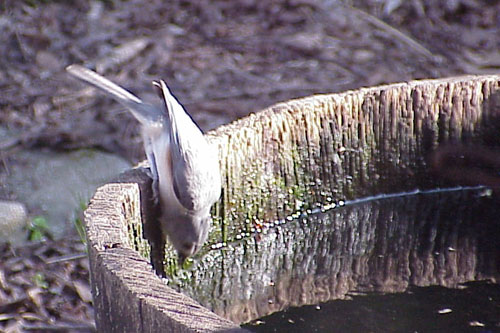
Titmouse drinking from outdoor planter.
(Photo by Sally Ramsdell)
September 19, 2011
Coastal Cleanup Day
Those of us living in the
interior of America have no coastlands. However, let us extend our areas of
interest to lakeshores, river and creek banks, and even pond margins. All too
often debris floats in, or litterers toss materials that do not decompose
easily, and this mars the beauty of where water meets land. In turn, it does
not take much to give a messy, junked up appearance to what should be an
enjoyable site.
Some
have pointed out that in the last few decades when plastics came into vogue, the
vast oceans have become junked up places and much of this debris eventually
reaches the shorelines. Some beaches and seashores that were such inviting
places for early morning or late evening strolls are now in disarray through
carelessness on the part of many -- who ought to be fined the $500 littering
offense that is virtually never enforced or collected. The damaged coastlands
have become "crime scenes" of careless people, some who see nothing in
abandoning responsibility as long as no one is looking. It takes far more
effort to recycle or dispose of waste material properly than to dump it
secretly.
On
several occasions, our Daily Reflections mention that outsiders ought not
be brought in for cleanups even though the light work often has enormous
benefits when performed by the inexperienced. Beach-combing parties have their
place, but the ones who clean up ought to be the users. When outsiders do the
work, the inference is that locals can continue to be negligent and their
actions never tested. However, some point out that no one is truly an outsider
when it comes to general environment and a love of pristine conditions. It is
laudable that some daily hikers take along garbage bags to collect litter.
Taking care includes cleaning up even when we are not individually the cause,
since the one who causes will most likely never be caught -- and we can
cultivate a justified anger at what has been done. Don't forget that those who
refuse to accept back beverage containers are among corporate litterers. Let's
continue to press for bottle bills.
Cleaning
up the common public coastlands that are trashed should not mean that shores
ought to be privatized. Rather, public coastlands are to be policed. Often the
emphasis is on curbing regulators who are public enforcers of lands and then
pronouncing the junked land worthy of privatization. On the other hand, public
lands (and that includes coastal lands) are public lands deserving protection.
"Carry out what you carry in" applies to our ventures in all public places,
whether the high seas, or the land, or the borders between them. Too often it
is the scenic marine borders that are most blighted, and thus where cleanup
efforts are most needed.
Prayer:
Lord, assist us to remain tidy in our precious space, and to teach others the
same. Give us energy to assist with cleanup when that is called for, and try to
parse out blame as that becomes necessary.
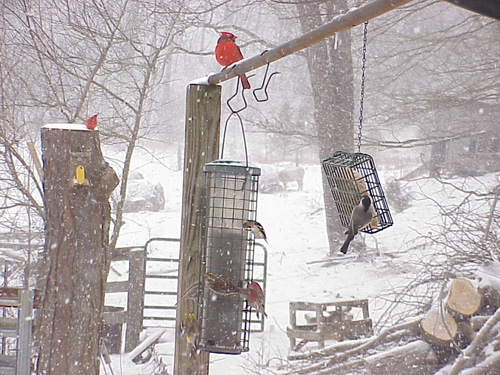
And they all get along...
(Photo by Sally Ramsdell)
September 20, 2011
International Day of Peace
"Peace
be with you," is the familiar liturgical refrain found in key places in the
Gospels. The need for interior peace is paramount as we prepare for our
International Day of Peace. Internal peace is the foundation of a
peaceful world, for true peace starts with peaceable individuals and moves out
like a ripple to all parts of the world. The prayer we make is that all people
experience internal peace of soul, for that becomes the foundation for a just
social structure for which we all yearn so deeply.
Individual
peace-making ventures extend to family and communal peace through
patience and love. Peace grows through sharing the fears and struggles of those
with whom we are in a network of love. So often this form of peace becomes the
social capital on which progress in community expands. Often the differences we
all have manifest themselves most tellingly at this neighborhood level. Peace
comes in controlled emotions and through merciful action: the healing balm of
communities.
Regional
peace is often overlooked, for areas of competition make us belittle others
and inflate our own achievements. Some regard pitting groups against each other
as a mark of capitalistic endeavor and development, but pity the ones who are on
the bottom of the heap; there is where bitterness and extra stress festers and
leads to battles which destroy peace. By working together in joint regional
endeavors, we all can win. Conflicts result when many find no employment in
their region, and they are forced to migrate to better pastures or perhaps to
sink into a hopelessness that leads to violence.
National
peace is a matter of discovering security not in military might but in
mutual assistance to others in need. A national security system ought to
consider giving to those one or more billion people terrorized by hunger (mostly
in other countries). A national peacemaking policy must include turning
national armed defense forces into mobile units that can respond to natural or
human made disasters at home or abroad.
International
peace can be achieved if the national policies of United Nations members
work for genuine peace. Nuclear weapons must be eliminated ASAP, and with no
exceptions, and the more powerful nations must lead the way. International
cooperative efforts are often insufficient to limit piracy on the high seas and
the deliberate damage to parts of the total commons due to lack of enforcement
that crosses national boundaries. Peace is threatened when some pollute
waterways and the air. Peace is damaged when some have enormous wealth and
others are destitute. Global peace must rest on a federated organization
with enforcement powers, and we ought to call for this to come about very soon.
Prayer:
Lord, help us to move up the ladder from personal interior peaceful pursuits in
cooperation with others of good will, and as a groundswell to the demands of a
global peace.
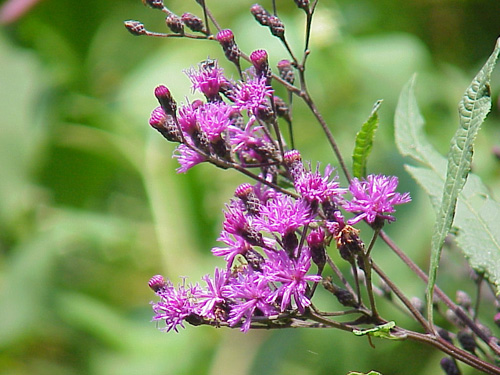
Ironweed, Vernonia altissima. Estill Co., KY.
(Photo by Sally Ramsdell)
September 21, 2011
St. Matthew's Day
This
is the year of Matthew's gospel, and in truth I have come closer to him this
year than any other. Amazingly, once while assembled in a group of four I
suspected that all would agree that Luke's gospel was the favorite; however, to
my amazement each of the other three chose a different gospel. Maybe we like
the various ones because of our personalities, or maybe something must be said
for the periods in our life's journey. For me, this seems to be becoming a
"Matthew Period."
Each
of the Gospels has its own uniqueness and that applies to Matthew as well.
True, most of the parables of Jesus that Matthew relates are repeated in the
other Synoptics (Mark and Luke). Still Matthew has a special unique flavor: the
entire infancy account of the wise men and the flight into Egypt; the beatitudes
and the entire evangelical discourse; the entire text of the "Our Father;" the
entire story of the beheading of John the Baptist; Peter's full profession of
faith and the building of the Church; the Last Judgment and related questions;
and the final Grand Commission to go to all the world. Matthew has the great
inclusion at the beginning of his gospel (Emmanuel or "God with us"), and the
promise to be with us until the end of the ages at the conclusion.
A
theme that comes through in the Gospel is the universal message to all people, a
message that goes beyond the limit of national boundaries (guiding star to
Bethlehem) to the ends of Earth. The beatitudes make Matthew a darling of
those who press for social justice -- and rightly so. The instrumentality of
spreading the message shows a sense of orderliness of the Matthew mind. The
sense of charity and God's extended gifts to others appears in the beatitudes
and the teachings that immediately follow. Matthew, the tax collector, as an
agent for the Roman Empire, dealt with filthy money, of which many disliked but
did not want to part with either. Matthew had the duty to bring about this bit
of bad news (pay taxes), and thus was more prepared for bringing Good News later
in his life.
The
certainty of style in his writings did not carry over into an itinerary of his
travels after Pentecost. In some ways Matthew was the most traveled of
apostles, for by tradition he was supposed to have reached Ethiopia, Persia,
Syria and even Ireland. His martyrdom in some remote part of that world
testifies to the ultimate supreme and geographically overlooked sacrifice of one
who follows the Lord. Wherever the unknown place of death, still many places in
Europe say some of his relics reside in their respective churches (including at
least four in France alone). For a variety of far-flung reasons, Matthew is
known to be the patron of money changers, tax collectors, accountants, and
customs officials for reasons of the occupation from which he was called.
However, his patronage of alcoholics, ships, and hospitals makes us wonder.
Prayer:
Lord, inspire us to imitate Matthew's words and deeds, and to balance them both
in our journey of faith.

Close-up of the Sulphur butterfly, Phoebis sennae.
(Photo by Sally Ramsdell)
September 22, 2011
Social Networking: Formal or Informal
On
World Carfree Day we ponder how much the automobile has changed our lives
for better or worse. We contend with congestion, noise, pollution, parking
space, maintenance, winter ice, and fuel costs. This past July the people of
Los Angeles was forced to do without the use of the most busy throughway due to
a weekend of repairs -- and they even seemed to enjoy a brief "carfree"
condition. In fact, we sometimes crave the relaxed attitudes of yesteryear. Is
it like sauntering through an amusement park talking to everyone who is willing
to converse. A few like to talk to everyone; many prefer doing so on occasions;
some want to talk only to select individuals; and a few want no more social
contact, for enough is enough. Opening the floodgates of verbiage can reduce
activity to a state of paralysis. Thus, for the social contact advocate here
are some operative principles:
*
Subject limits. Social contact may include family affairs, medical
treatment, or discussion of basic ideas. We sort out such contacts according to
subject matter; we do not want to talk about gardening at the time of a funeral
of a loved one.
*
Set time limits. If we are to be carfree, make it a practice that knows
when to start and stop, lest meaningful car-related activity ceases. We have
got to count our blessings and abstaining from them occasionally makes their
presence fonder.
*
Set space limits. In some of our work we must have safeguards so that we
can maintain planned schedules. Perhaps the place could be invaded by the
uninvited if limits are not placed on sacred space. Electronic devices are
turned off due to the need to retire and rest. Allowances ought to be made for
the emergencies that undoubtedly come to all social beings.
*
Positive process. A sense of universal contact with all people has its
limits as well. For one thing, some folks glory in being negative and
disruptive; these parties of disruption are candidates for a form of
"excommunication" -- a public invitation that still has its own inbuilt limits.
"Open mikes" may be used but these have moderators.
Common
goals. Our social contact sphere is like the commons itself. We realize a
common time and place and subject matter, and then we expect others to stay
within these limits. We may expend resources limiting access to an event, or we
can be quite exclusive in the invitation listing. Amazingly, this is what
communities of believers do all the time. Barriers are established and adhered
to so that the public event can continue. Allowing one to destroy the meeting
as though that is an act of freedom is nonsense. The license to destroy is a
form of social suicide. Would that at times the cars would be turned off and we
return the horse age!
Prayer:
Lord, teach us when to be formal and when to take life with a little more ease
and informality.

Busy bee at work.
(Photo by Sally Ramsdell)
September 23, 2011
Restitution for Native Americans
Native American Day
is a time of mixed emotion. All Americans owe a debt of gratitude for all the
hospitality shown to those first Europeans who arrives at the New World. For
the most part this initial arrival was a period of hospitality along with
sharing a host of skills from growing the native food crops (e.g., maize), to
how to catch wildlife for food, to sports, to ways to come to consensus. But
more importantly, an attitude about land being held as commons for the entire
community was something that was not received well due to European preconceived
ideas of land.
A
history of expropriated land, exploited resources such as the destruction of the
bison herds, and forceful removal of tribes from their home territories cannot
be erased easily -- nor ought it. In fact, certain forms of restitution are in
order, and this is more than just addressing a guilt complex. A real disorder
came across the Americas when Native peoples were subjugated to European power,
and this disorder is in need of correction even centuries after the offense --
because the land and people remember.
First
of all, native people have rights to some portion of the land to call home, both
the recognized and unrecognized tribes -- without the possibility of alienation
of portions of the delineated lands to outside interests -- though licensing for
resource extraction could be allowed with proper safeguards.
Secondly,
financial resources should be made available to actively record and preserve
endangered languages. Opportunities ought to be afforded to native peoples to
encourage their acquisition and retention of native languages and customs. To
some degree, celebrations occur on an annual or periodic basis; however,
language and cultural restorative projects are far more difficult to bring to
fruition, though some examples are beginning to occur among certain Native
American nations. The majority of native tongues will be lost as unspoken if
positive steps are not implemented ASAP. One language is lost somewhere every
two weeks.
Thirdly, many Native
American reservations could be centers of renewable energy (wind, solar, hydro,
geothermal and some biofuels). The reservations themselves could supply the
rest of the U.S. with much energy, if resources were developed. Active
promotion of renewables and demotion of extraction of fossil fuels and uranium
materials should go hand-in-hand, especially since federal agencies have
mishandled accounts for many past decades.
Last of all, restitution for
injustices of the past must include ways of creating jobs for Native Americans
who suffer heavy unemployment. Tourism and cultural educational projects could
make life more meaningful for reservation people along with an effort to
facilitate those living elsewhere to return to their home areas.
Prayer:
Lord, teach us that restitution for past misdeeds is necessary for making things
right with Native Americans.

Ripening blackberries in Kentucky.
(Photo by Sally Ramsdell)
September 24, 2011
Celebrate the Black Walnut
The
Daily Reflection for November 3, 2007 focused on nut-gathering in general
-- and difficulties associated with the stain received in hulling black
walnuts. Other reflections were on the black walnut-prized wood for furniture
and paneling, as well as the possibility of investing in walnut groves. A
top-grade black walnut log can be marketed for thousands of dollars.
Prized
black walnut meats are worth retrieving -- though this can prove to be a chore.
Certainly the thin-shelled English walnut does appeal to those who desire a
meaty kernel with little effort and far less taste. However, many nut
connoisseurs will say the effort to extract black walnut meat is ultimately
worth the effort because of the exquisite taste. When I was embarrassed by the
walnut stain that did not leave my hands, my fourth grade teacher, Sister
Victoria, a Kentucky farm girl by birth, came to my rescue by telling the class,
"There is clean dirt and dirty dirt -- and the first type one wears with dignity
because it is the sign of honest work." I always look at the hands of laborers
when they receive Communion and know that these are hands of dignity.
Dyes. The black
walnut stain was so hard to remove from clothing that the homesteaders who
pioneered the region soon found that this could be a dye for their homespun
clothing.
Food
delicacies. The shelled walnut meats can be eaten raw or can become
ingredients in cakes, cookies, or a whole variety of baked goods. The walnuts
are great in ice cream, custards, yogurt, and other dairy products, and some
forms of vegetable, meat and fish dishes as well.
Business.
Since few take the time to extract black walnut meats, and those who do get a
nifty price for their products, many are not familiar with the pronounced walnut
flavor that is so loved. Getting the nut shelled takes an effort -- as our
neighbor with a large walnut tree says, "You can have them if you can get them
before the squirrels do." I did just this year before last and left a supply of
the nuts on my screened in back porch to dry. The squirrels broke through the
screen to steal virtually all the nuts; they knew a good thing either by sight
or smell!
Gifts.
A kindhearted neighbor in another county, Ray Graves, makes the shelling and
retrieval of the walnut meats a Christmas present and special anniversary gift
that is truly worth additional gratitude. Those who strive to repeat the
exercise learn quickly how much effort it takes to crack the hard nut and pick
out the meat from the compartments.
Prayer: Lord, you give
us many good things, some of which take an effort to retrieve. When we do, this
becomes a special occasion to thank you for the gifts of autumn. Black walnuts
are one of these special gifts.
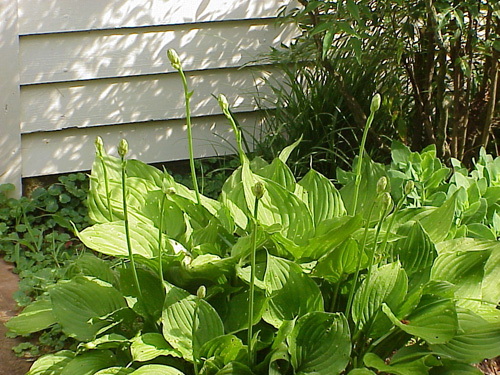
Young buds of the hosta plant.
(Photo by Sally Ramsdell)
September 25, 2011 Parable
of Two Sons and Assuming Responsibility
Remember your mercies,
O Lord. (Psalm 125)
The parable today (Matthew
21:28-32) is about two sons, one who says he will obey his father's request, but
does not, and the other who says he will not, but later regrets it and obeys the
command. The second is highlighted as doing God's will. The first most likely
deceived himself by thinking himself obedient when he wasn't, and the second
knew what he did wrong and corrected it. The second took on his
responsibilities though later than was originally asked. The parable continues
with Jesus likening the pharisees to the first of the two sons; they object to
Jesus' spending so much time with the outcasts of society, who represent the
second of those sons.
We too can enter into the
actions of the first son, saying we will follow the Lord, and then little by
little doing certain actions by rote, but failing in our hearts to be true
followers. When it comes to religion, we may obey the rules and regulations
expected of us and yet our hearts are hardened. When it comes to respecting the
planet itself, we may carry a bag of recyclables to a deposit center in a gas
guzzler and fail to conserve on resources in a more genuine manner. When it
comes to life itself, we may answer all legal matters, pay our taxes, and yet
omit practicing good citizenship when it really counts.
The
sinner who returns and regrets wrongdoing is the model, not as an outcast who
glories in a wrongful past. The proper form is to acknowledge and take
responsibility for what one does. Today, many of us follow the course of Adam
and Eve and blame the woman or the serpent for the wrongdoing, when it is in
freedom that we act. We glory in our freedom to choose, but when we make bad
choices we tend to blame others. Parents certainly are partly to blame for they
may not want the young people fully to take responsibility. For some of them,
their child is never wrong; maybe it was the environment, bad influences, lack
of governmental programs, but never the individual who does wrong..
Each of us must bear our
responsibilities, and when it comes to damage to our wounded Earth this is not
an easy thing to do. Congress must be responsible for spending what it does not
have; so should nations that incur massive debts; so ought individuals who live
beyond their means or who drink and drive. If we come down to the heart of the
parable, we do not fit neatly into the first or second class; many of us are
first class people who say "yes" yet never act. However, precious time remains
right now to join the second class who really said "no" more often than we
thought. Now is the moment to change.
Prayer:
Lord, help us to be responsible healers of Earth. Inspire us to change our
attitudes to where we now come to assist a broken world because you have called
us to do so.

Green darner, Anax junius, expertly blended into background colors.
(Photo by Sally Ramsdell)
September 26, 2011 Vatican
City: Carbon Neutral and Pro-Environment
We
call on all people and nations to recognize the serious and potentially
irreversible impacts of global warming caused by anthropogenic emissions of
greenhouse gases and other pollutants and by changes in forests, wetlands,
grasslands, and other land uses. Pontifical Academy of Science, May 2,
2011
From the writings of Pope
Benedict XVI and his scientific advisers to the actual energy policy of the
Vatican State, there is a hue of green over Rome. The goal is to make tiny
Vatican City the first fossil-fuel-free nation in the world. This is happening
through a combination of energy efficiency programs and obtaining the state's
energy from 2,700 solar panels on the 5,000-square-meter Paul VI Auditorium (300
KW of energy a year). Also, energy needs including air conditioning in Vatican
cafeteria were met this summer by solar energy units. In addition, Vatican City
owns property in the outskirts of Rome that is being turned into a solar farm
with intention of exporting renewable energy.
The Pope has spoken on
numerous occasion on the need to conserve global resources and to use them
properly. Also he has been vocal about his concern over environmental
degradation and has criticized a lack of real commitment to mitigating climate
change.
The destruction of the
environment, its improper and selfish use, and the violent hoarding of the
Earth's resources cause grievances, conflicts and wars, precisely because they
are the consequences of an inhumane concept of development.
Benedict XVI address
to 2006 World Peace Day.
The
pope and his scientific advisory groups say that nations and individuals have a
duty to reduce greenhouse gas emissions and enact policies that mitigate global
warming. This groups refutes the business-as-usual approach of many in our
materialistic culture. This group is well aware that the vast majority of the
global scientific community predicts very rapid climate changes in the coming
years to surface and perhaps accelerate in the next decade. The Vatican City
deeds match the Pope's words of concern about environmental problems -- and must
be regarded as moral leadership in this truly pro-life issue.
Environmental degradation is
a heavy burden on the poor. The Pope joins the intellectual community in
realizing that emerging nations look to the West for both practical and moral
leadership on many matters, including the practical endorsement of fossil-fuel
reduction programs. He is aware that if we as a people fail to act, a predicted
two-degree global temperature rise will be doubled with catastrophic effects on
the world's poor -- and so environmental protection is a current social justice
issue.
Prayer:
Lord, help moral leaders break silence over the environmental issues and follow
the lead of Pope Benedict XVI.

Photo entitled "Survivor Rose" by Sally Ramsdell.
September 27, 2011
Expanding Our Healing Ministries Ten Ways
Healing
is a ministry of this website, and we indicate a wide variety of ways to heal --
in fact so many that just about every person can enter into one or another form
of participation. Here are some of the one hundred healing ways discussed in
the course of these years of Daily Reflections:
Forgiveness:
Why first on the list? Because the greatest treatment for illness is a heavy
dose of love and mercy. We must forgive so we can be forgiven, and thus become
better at our healing ministry.
Reclamation: Wounded
land surface areas need to be recovered through installing vegetative protection
and through proper reuse of the area under question. Wise choices are needed.
Community-building of
trust: Too many of our localities suffer from rivalry and competition with
others for jobs, recognition, and talent, and this is grossly detrimental to a
healing cooperative spirit among people..
Nutrition:
Individually, we must be healthy in order to become able healers to assist
others. The best healing we can do physically is to eat proper foods in proper
amounts and to exercise daily.
Animal
and plant welfare: Many of the animals and some of the plants of our world
are threatened or endangered through loss of habitat or aggressive harvesting
practices. We must be defenders of our floral and fauna.
Peacemaking:
Establishing peace is no easy task, but it must be done by all of us at the
family level, the local community, our nation, and our entire world. All are
called to be peacemakers.
Family
Support: Too often the wounds that fester within family circles cause
hatreds and barriers to giving each other the love needed to overcome
differences and to work together.
Communication:
By talking to and listening to each other the grave differences that separate so
many of us are overcome. Literacy programs and dialogue all have parts to play.
Celebration:
Thanking God for the many gifts we are given becomes an occasion for reconciling
with others and coming together in moments of unity.
Reclaiming
the Commons: The disproportion of resources and essentials among people is
a sickness that is healed when we take and share what is rightfully ours,
collectively and non-violently.
Prayer:
Lord, help us see the many ways to heal and to know ourselves as to how we each
can be most effective in our ministry.

The Mad Song Sparrow (Melospiza melodia). By
Sally Ramsdell
(*To
read about the "Mad Bluebird" click here)
September 28, 2011
Interacting with an Emerging China
It does not matter how
slowly you go, as long as you do not stop. Confucius
It is not easy for
competitive people who regard themselves as number one to step aside -- but
maybe the imagery is false. We are not meant to stop and allow another nation
to pass us by; far better is to keep moving and allow those with added energy
to come up and walk with us. Stepping on top or over another is a poor image of
what world development needs to be in these times of a threatened environment.
Such imagery breeds destructive anger. The better image is joining forces and
movement in one direction as a body, not as competing individual racers in a
marathon.
Our
American speed in movement towards innovation, patents, use of resources, and
all the material benefits simply has to slow in a finite world. For China to
reach our level of consumption could be regarded as an emerging nightmare, for
their population is almost four times our American one. Consumption-wise, the
West must slow down but does not have to stop. Move always forward but in
deeper and more spiritual dimensions.
To
slow down the movement of consumer spending could be a good thing whether done
in the United States or in China. When spending is meant for necessary
infrastructure or for assisting farmers in need of better agricultural methods
(whether in these two countries or elsewhere), it requires expenditures for
consumer goods: fertilizers, improved seeds, irrigation equipment, market
road-building equipment and materials, storage buildings for holding crops, and
on and on. Manufactured products still need to be produced. What is not needed
is a second vehicle, more electronic equipment for the affluent, and more
spacious housing. Wealthy and emerging nations must make distinctions and do so
before it is too late. Economies of whatever structure ought to focus on this
distinction: material growth for the needy; spiritual growth for those with
essentials. The slower pace must be set in luxury goods; an accelerated pace in
essential goods.
Amazingly, this also has
much to do with military expenditures. What is needed for world security is
health facilities and services, better and lower-priced medicines, facilities
for housing care-givers. Health security is paramount. Dollar-for-dollar such
health costs are lower than military equipment costs, and so there is more bang
for the buck by converting military to the true global insecurity -- lack of
food and health facilities.
Prayer:
Lord, inspire us to enter into conversation with all nations and especially
emerging ones; help us abandon school-boy competitive approaches but see the
need for cooperative efforts among mature adult citizens to solve some of the
grave world problems by working together to establish development priorities.

Enjoying the Rose of Sharon.
(Photo by Sally Ramsdell)
September 29, 2011 Wisdom
of the Elders Versus Selfishness
I
am an old man, and that says much with fading energy, duration, stamina, and
attention powers. So, there is still something that becomes evident as we age:
the younger folks are more focused on shorter-term goals than are the elderly.
For them career enhancement, peer acceptance and job security are foremost --
and rightly so for many of them with such responsibilities as bills to be paid,
credit to maintain, and family duties to perform. Unfortunately, over a million
American elders are now raising their neglected grandchildren and many more are
holding post-retirement jobs. However, for the greater part, elders can think
ahead to eternal life, a long-term goal worth reflecting upon.
Consideration
is not necessarily something private and just done as individuals or in
small-group clusters. Nor is the public issue one of celebrating birthdays and
anniversaries. What is lacking today is elder wisdom expressed in the public
policy forum. However, we are faced with a concurrent fact: the material
security of elders is better provided for at this time than what can be
anticipated in subsequent generations with less material resources being
available for them. Keeping these areas of security has become a major focus of
elder efforts and which younger wage-earners and un- and underemployed envy in
these hard times.
Elder
wisdom is mixed, and thus its full potential can only be appreciated when
honestly acknowledged. The first topic should be: postponing payment for past
mistakes must not be deferred. The first area of elder wisdom must be concern
about the preserving of a threatened and endangered Earth, hardly a happy legacy
to pass on to a future generation. Some portion of inheritance taxes should be
allotted for reclamation projects, so as not to pass on nest eggs to those
survivors fortunate enough to be related. In fact, only modest amounts should
be allowed to be passed on due to a collective need for restitution from the
preceding generation. Environmental damage has occurred
and profits of the past have occurred due to lax enforcement of regulations.
The
second responsibility of elders is not to expect extra lenient treatment for us,
especially from limited health facilities where resources could be better spent
on those with needs due to responsibility, not merely old age. Prolonging lives
which will not recover is not good economics, nor good charity; it only keeps
the health industry healthy, and that is not sufficient. In primitive cultures
people realized when they could not recover sufficiently and accepted the
impending consequences of not being given special care. This is a difficult
subject and one that (when not in need of costly treatments) is easy to say.
Proclaiming wisdom, which must be said even when difficult, is always within
the context that these are the parting words of elders.
Prayers:
Lord, teach us elders how to share and to avoid being selfish with gifts given;
teach others to hear the message of the elders, and thus share with them through
listening.
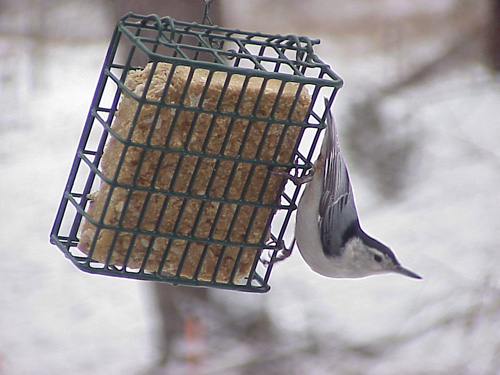
Nuthatch on suet in Kentucky winter.
(Photo by Sally Ramsdell)
September 30, 2011 A
Wonderful Memory: Mary Byrd Davis
I
shared this birthday with a colleague of three decades who passed on to the Lord
in February. Memories stand out for many of us when we recall birthdays, and
this is one of those. Had she lived today, Mary Davis would be 75, which is a
special celebratory year for many. While she is sorely missed by the
Earthhealing team, we still are confident that the good Lord has rewarded her
with a sense of wonder from a distant view of our troubled planet.
Mary
had a deep devotion to environmental issues ranging from domestic, neighborhood,
and city to regional, national, and global ones. Nothing was so daunting that
Mary was not the first to research the matter in her own thorough and clear
English manner. Her words were well-placed, of balanced emotion, never
flippant, always accurate to the degree she was able to gather the facts, and
always balanced with complete credit to sources. She was instinctively loyal
to those with whom she worked and had a great love for the work of her spouse of
many years, Bob, and to her children and grandchildren. Thus her last recorded
word on hearing of the environmental success of her son John was "Wonderful."
What an excellent and well-chosen parting word, for her sense of wonder will
always remain with the many people whose lives she touched.
God bless her!
Wonderful
We wonder --
how much the
perfect world we dreamed,
will actually come
to be,
whether our land
will stay numero uno,
what words will
linger into eternity.
We wonder --
how much of what
we say
will remain a
solid legacy,
or will the books
be forgotten
and life's
truer gift is progeny.
We wonder
what comes along
our rough-trod paths
that tend to go
so easily asunder,
Please Lord, help
us to keep always
our childhood
sense of full wonder.
Prayer:
Lord, allow us to see the wonder of your creation, to feel it in our bones, to
proclaim it with our words spoken and written, and to instill it in the hearts
of those with whom we communicate through the wonder that shines in our eyes and
hearts. And thanks for the wonderful people who touch our lives such as Mary
Byrd Davis.
|